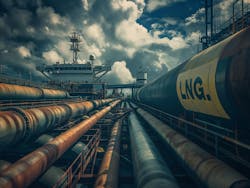U.S. LNG Rising Globally: Lake Charles LNG Awards EPC for Converting Gulf Terminal into Export Facility
KTJV will handle engineering, procurement and construction (EPC) contractor duties on building out a Lake Charles liquified natural gas export project along the Louisiana Gulf Coast.
Lake Charles LNG selected the KTJV joint venture of Technip Energies and EPC and operations firm KBR. The KTJV joint venture will oversee work to convert Lake Charles LNG’s current import and regasification terminals into an LNG export terminal.
LNG is natural gas pipelined to terminals which then chill it cold enough to liquify and make stable for shipping. The shale gas evolution has pushed the U.S. into status as a global natural gas exporter.
The project will enable a facility capable of 16.45 metric tons of LNG exported per year (Mtpa), including three 5.5 Mtpa modular LNG trains, brownfield modification to LNG storage, along with procurement, transportation, fabrication, installation, commissioning, and startup of the terminal.
“The structure of the contract provides alignment between KTJV and Lake Charles LNG to achieve a high-quality, cost-effective project,” said Tom Mason, President of Lake Charles LNG. “Our determination to issue a notice to proceed under the contract will be subject to our making a final investment decision to proceed with the project which will be based on obtaining sufficient commercial offtake commitments and third-party equity to satisfy our internal objectives.”
Lake Charles LNG is backed by BG Group and Energy Transfer Partners. Last decade, the U.S. Department of Energy granted the company an award to export up to 2 billion cubic feet of natural gas per day.
In 2019, the Federal Energy Regulatory Commission gave its approval for a 5-year extension to build and place the LNG export terminal into service.
The U.S. ranked first last year in LNG exporting globally, according to the federal Energy Information Administration. Daily LNG exports averaged 11.9 billion cubic feet per day, which was 12% higher than in 2022, according to the EIA.
Europe is the top destination for U.S. LNG experts, with more than two-thirds going to nations on that continent. Much of northern Europe is transitioning away from Russian natural gas after that nation invaded Ukraine two years ago.
Cooling down methane natural gas down to minus 260 degrees Fahrenheit liquifies it and reduces pressure of the gas.
Many paths to net zero in the C&I Energy Transition
Track them all with our EnergyTech Free E-Newsletter
About the Author
Rod Walton, EnergyTech Managing Editor
Managing Editor
For EnergyTech editorial inquiries, please contact Managing Editor Rod Walton at [email protected].
Rod Walton has spent 17 years covering the energy industry as a newspaper and trade journalist. He formerly was energy writer and business editor at the Tulsa World. Later, he spent six years covering the electricity power sector for Pennwell and Clarion Events. He joined Endeavor and EnergyTech in November 2021.
Walton earned his Bachelors degree in journalism from the University of Oklahoma. His career stops include the Moore American, Bartlesville Examiner-Enterprise, Wagoner Tribune and Tulsa World.
EnergyTech is focused on the mission critical and large-scale energy users and their sustainability and resiliency goals. These include the commercial and industrial sectors, as well as the military, universities, data centers and microgrids. The C&I sectors together account for close to 30 percent of greenhouse gas emissions in the U.S.
He was named Managing Editor for Microgrid Knowledge and EnergyTech starting July 1, 2023
Many large-scale energy users such as Fortune 500 companies, and mission-critical users such as military bases, universities, healthcare facilities, public safety and data centers, shifting their energy priorities to reach net-zero carbon goals within the coming decades. These include plans for renewable energy power purchase agreements, but also on-site resiliency projects such as microgrids, combined heat and power, rooftop solar, energy storage, digitalization and building efficiency upgrades.

